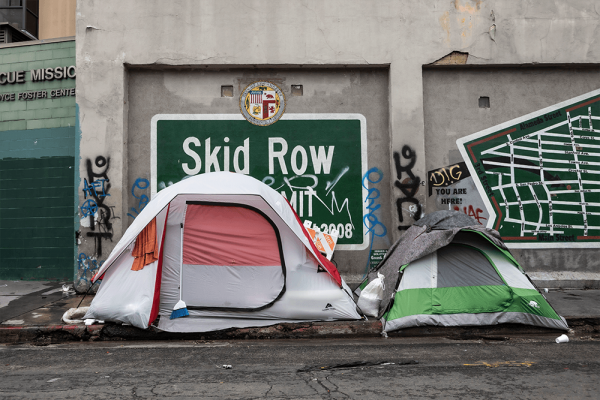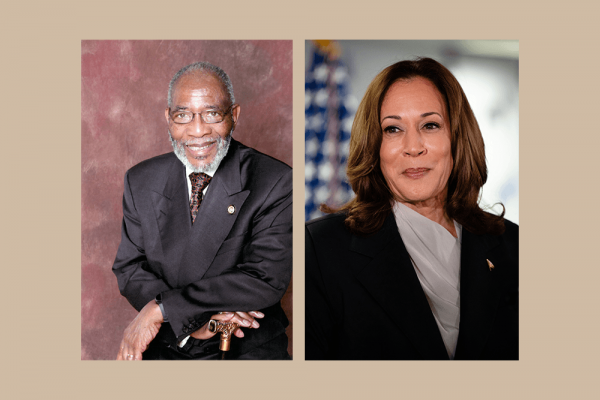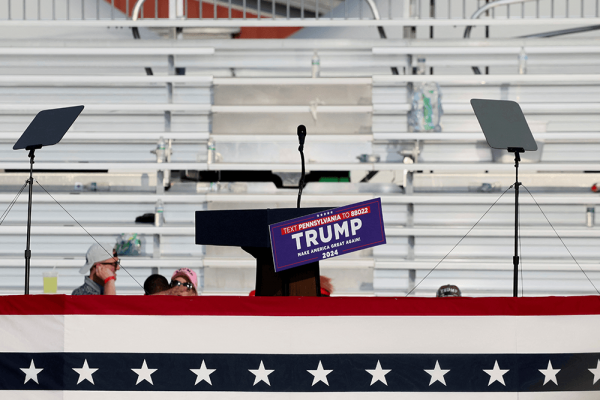It’s an overcast Saturday morning on Gladys Avenue in Skid Row — a 54-block area in downtown Los Angeles, home to one of the country’s most stable populations of people experiencing homelessness or housing insecurity. Andrew Jiang of Alhambra, a city in western Los Angeles County, is there with a group of around 15 other volunteers with the Friars and Sisters Poor of Jesus Christ to serve chicken, rice, and vegetables to some 150 people living on Skid Row. On other days, a team of friars, nuns, and volunteers will walk block to block, distributing up to 400 sandwiches to more than 200 people.
Then, after the service, Brown received a phone call from another member who was absent that Sunday: Vice President Kamala Harris, who was preparing to run a very different type of race.
“She said to me, ‘Pastor, I called because I want you to pray for me, [my husband] Doug, this country’ — and finally she said — ‘and the race I am intending to run for president,’” Brown told Sojourners on Monday. “We exchanged pleasantries, I congratulated her because she’ll be a great president, and we had prayer. She was so gracious and thankful that I took the time.”
No wonder it is so difficult to integrate authentic spirituality into the world of secular politics — which often measures worth in terms of winning and acquiring. The values of our political culture often contradict the wisdom of faithful Christian community. That’s why President Joe Biden’s decision to withdraw his candidacy for reelection felt so breathtaking. Voluntary relinquishment of political power is not commonly seen as a virtuous act, but rather a disorienting, shocking abandonment of prevailing norms.
“To me being Christian means f---ing s--- up,” Layshia Clarendon told ESPN’s Katie Barnes. “That’s what Jesus came to do. It means disrupting and fighting for the most marginalized people.” During the 2020 WNBA season, they helped lead players in protesting police violence against Breonna Taylor and other Black women. Clarendon helped launch the WNBA’s Social Justice Council, alongside players like Sydney Colson, Breanna Stewart, Tierra Ruffin-Pratt, A’ja Wilson, and Satou Sabally. Clarendon signed on to the Athletes for Ceasefire in Gaza, and they launched a foundation to provide grants that help transgender people access health care and other services.
As a dedicated sports fan, I am extremely excited to watch this year’s lineup of the 2024 Summer Olympics, starting in Paris on Friday, July 26. The U.S. women’s basketball team is competing for their 8th consecutive gold medal; Simone Biles may just win it all — again; and though I know nothing of the sport, I am always excited to catch a fencing bout. However, as a Christian, I am also paying close attention to the ways in which religion is being utilized — for good and for bad — at this year’s Olympic Games.
“It’s a shame he missed.”
That was the first thought I had when I saw that someone had attempted to assassinate former President Donald Trump. My second thought was, “You shouldn’t think that — you consider yourself a peacemaker and pacifist.” I wondered how my Christian commitments could erode so quickly.
Like any other Gen Zer, I’ve grown up hearing about the potential harms of social media: As early as elementary school, teachers and parents warned us of stranger danger, not just in the grocery store, but also online. I was 12 when I got my first social media account on Instagram (even though my hand-me-down iPod Touch didn’t have a camera). In seventh grade, I, and many of my classmates, wrote our final essays for English class on the influence of social media on teenage girls’ body image. I was in junior high when news broke that Facebook user data had been improperly harvested to manipulate U.S. voters. In my high school’s speech and debate club, I learned about dangers of doxxing — posting people’s personal information, like addresses, online as a way to target them for violence. And in my own work here at Sojourners, I regularly see the hate and homophobia that shows up in social media comments.
Many of us are feeling fear, disorientation, or anger at this moment. As Christians, we need to meet perilous feelings with a resolve to follow Jesus and remember his teachings: The truth will set us free, and we must learn to love our enemies.
In recent years, the work of librarians has been sucked into the center of the “culture wars” as fascist and authoritarian movements in the U.S. attempt to censor materials, especially about queerness and racial justice. Meanwhile, justice movements have recognized how libraries are a shining example of public-funded community goods.
After former President Donald Trump was shot in the ear during a campaign rally on Saturday, faith leaders expressed their disavowal of political violence, reflections on how to reduce polarization, and a desire for other forms of violence to be taken seriously.









